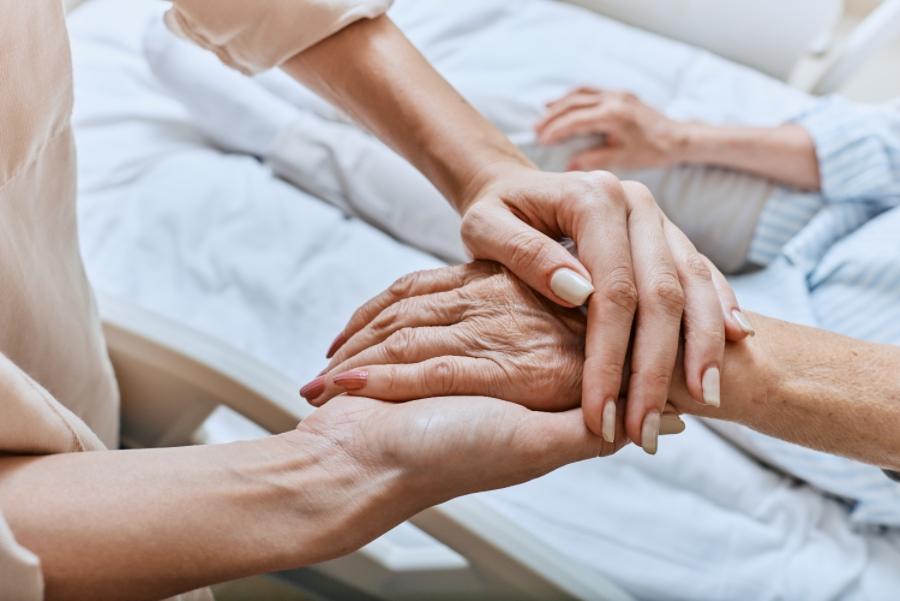Hospice Care

The spirit of everyone at Assurety is to encourage quality of life for patients and their families. Because of this enduring philosophy, pain and symptom control lie at the very heart of our hospice program of care. Assurety's hospice care plan is far more cost effective and personalized when compared to most hospice options.
Finding Comfort In the Most Stressful of Times
Our staff members are kind, caring and specially trained in the unique issues surrounding death and dying. They communicate well, are good listeners, and are interested in working with families who are coping with a life-threatening illness. During such times of need, the last thing you should have to worry about are expenses and high costs of care. Assurety provides the caring assistance you need without the concerns of exorbitantly high costs.
What is Hospice?
Hospice, also known as end of life care, gives treatment to help relieve disease-related symptoms, but not cure the disease. Its main purpose is to focus on quality, rather than length of life. The goal of hospice is to allow patients to be comfortable, continue a pain-free life and to manage other symptoms so that their last days may be spent with dignity and quality, allowing them to stay in control of and enjoy life surrounded by their loved ones.
Side effects and symptoms are managed to make sure that the patient is as free of symptoms as possible, yet still alert enough to enjoy the people around them and make important decisions. In addition to symptom and pain relief, hospice offers emotional and spiritual support to the individual and their families, typically in the last six months of life.
Family-Centered Care
Hospice involves the patient and the family in making decisions. Care is provided for the patient and family 24 hours a day, 7 days a week. The patient and caregivers are encouraged to contact the hospice team if there is any problem. Hospice care assures that the patient and their family that they are not alone and help can be reached at any time.
Needless pain can bring unnecessary distress to a person who is dying and the loved ones caring for them. Our hospice professionals at Assurety are committed to bringing pain under control as quickly as possible. An important principle in the approach is that drug doses are carefully adjusted for each patient. This assures pain relief without loss of alertness. In treating the patient, the hospice doctor and pharmacist are guided by assessments that are repeated as often as necessary, with adjustments in medications so that the patient will be as comfortable as possible. Ease of administering is an important consideration too. Patients are spared injections whenever possible to make their lives more comfortable.
A Dedicated Hospice Team

As in patient care, hospice care is a task that requires constant assessment, support, and coordination to help patients pursue the goal of quality living. An interdisciplinary health care team manages the hospice care. This means that many interacting disciplines work together to care for the patient. The interdisciplinary team coordinates and supervises all care. Doctors, nurses, social workers, counselors, home health aides, clergy, therapists, and trained volunteers all care for the individual. Each of these people offer support based on their special areas of expertise.
As a team, they review the patient's status daily and monitor psychological and spiritual pain. In addition, consultants in several fields of health care complement the efforts of the medical and nursing staffs. This team is responsible for making sure that all involved services share information. Together, they then give the patient and their loved ones complete palliative care aimed at not only relieving symptoms but giving essential social, emotional, and spiritual support. These professionals maintain medicine as an art, a science, and a philosophy. Because of their energy, dedication, and professional skills, they uphold a tradition of quality patient care.
Professional expertise and an individualized care plan make possible a control of pain rarely achieved in other health care settings. Nowhere is this more evident than in the work of the hospice team. The hospice care plan must be creative, and flexible to react to the constantly changing challenges of declining health. Some symptoms can be relieved by simple measures such as massage, relaxation techniques, and distraction through arts and other activities.
The Highest Respect for Each Individual
Hospice care also tends to spiritual needs. Since people have different spiritual needs and religious beliefs, spiritual care is set up to meet those specific needs. It may include helping a patient to look at what death means to them, helping say goodbye, or helping with a certain religious ceremony or ritual.
Family members can stay informed about a patient’s condition and what to expect through family conferences, often led by the hospice nurse or social worker. Family conferences also give everyone a chance to share feelings, talk about expectations, and learn about the process of dying and death. Family members can find great support and stress relief through these family conferences. Support may also be done informally on a daily basis as the nurse or nursing assistant talks with the patient and caregivers during their routine visits.
Schedule a Visit